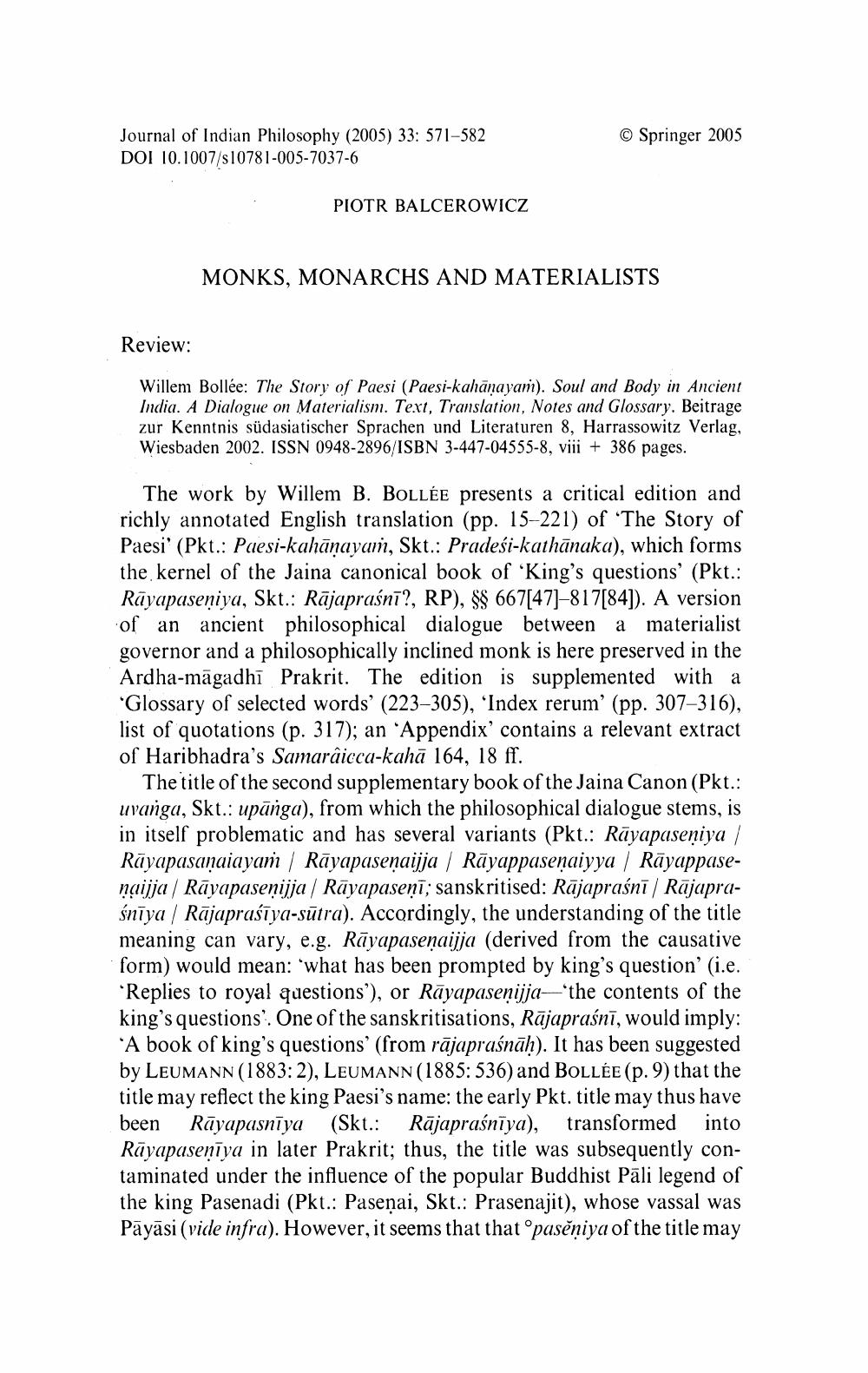Book Title: Monks Monarchs And Materialists Author(s): Piotr Balcerowicz Publisher: Piotr Balcerowicz View full book textPage 1
________________ © Springer 2005 Journal of Indian Philosophy (2005) 33: 571-582 DOI 10.1007/s10781-005-7037-6 PIOTR BALCEROWICZ MONKS, MONARCHS AND MATERIALISTS Review: Willem Bollée: The Story of Paesi (Paesi-kahānayan). Soul and Body in Ancient India. A Dialogue on Materialism. Text, Translation, Notes and Glossary. Beitrage zur Kenntnis südasiatischer Sprachen und Literaturen 8, Harrassowitz Verlag, Wiesbaden 2002. ISSN 0948-2896/ISBN 3-447-04555-8, viii + 386 pages. The work by Willem B. BOLLÉE presents a critical edition and richly annotated English translation (pp. 15-221) of 'The Story of Paesi' (Pkt.: Paesi-kahānayam, Skt.: Pradeśi-kathānaka), which forms the kernel of the Jaina canonical book of King's questions (Pkt.: Rāyapaseniya, Skt.: Rājapraśnī?, RP), $$ 667[47]–817[84]). A version of an ancient philosophical dialogue between a materialist governor and a philosophically inclined monk is here preserved in the Ardha-māgadhi Prakrit. The edition is supplemented with a Glossary of selected words' (223–305), 'Index rerum' (pp. 307–316), list of quotations (p. 317); an 'Appendix' contains a relevant extract of Haribhadra's Samarâicca-kahā 164, 18 ff. The title of the second supplementary book of the Jaina Canon (Pkt.: uvariga, Skt.: upanga), from which the philosophical dialogue stems, is in itself problematic and has several variants (Pkt.: Rāyapaseniya/ Rāyapasaņaiayam / Rāyapaseņaijja / Rāyappaseņaiyya / Rāyappasenaijja/ Rāyapasenijja / Rāyapaseni; sanskritised: Rājapraśnī / Rājapraśniya / Rājaprasīya-sūtra). Accordingly, the understanding of the title meaning can vary, e.g. Rāvapasenaijja (derived from the causative form) would mean: 'what has been prompted by king's question' (i.e. *Replies to royal questions"), or Rāyapaseņijja—the contents of the king's questions. One of the sanskritisations, Rājapraśnī, would imply: 'A book of king's questions' (from rājapraśnāl). It has been suggested by LEUMANN (1883:2), LEUMANN (1885: 536) and BOLLÉE (p. 9) that the title may reflect the king Paesi's name: the early Pkt. title may thus have been Rāyapasnīya (Skt.: Rājapraśnīya), transformed into Rüyapasenīva in later Prakrit; thus, the title was subsequently contaminated under the influence of the popular Buddhist Pāli legend of the king Pasenadi (Pkt.: Pasenai, Skt.: Prasenajit), whose vassal was Pāyāsi (vide infra). However, it seems that that opasēņiya of the title mayPage Navigation
1 2 3 4 5 6 7 8 9 10 11 12
